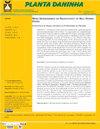Herbicide resistant barnyardgrass in Iran and Turkey
IF 0.8
Q3 Agricultural and Biological Sciences
引用次数: 4
Abstract
Background: Inconsistent control of Barnyardgrass has been reported repeatedly by farmers in major rice growing areas of Iran and Turkey. Objective: Thus, a greenhouse study was conducted to investigate the resistance of Barnyardgrass to acetyl CoA carboxylase (cyhalofop-butyl) and acetolactate synthase (penoxsulam, bispyribac-sodium) inhibiting herbicides. Methods: The seeds were sown in pots in a greenhouse and after screening, were sprayed with various rates of cyhalofop-butyl, penoxsulam and bispyribac-sodium herbicides at 3-4 leaf stage. Four weeks later, the above ground biomass was cut, dried in an oven and weighted. The results were then analyzed in the R software (drc package) using a four or three parameter log-logistic function. All experiments were repeated twice. Results: While 30% of biotypes collected from Turkey were not controlled by ACCase inhibitors at twice the recommended rates, no resistance was observed in Iran’s samples. Only one biotype exhibited cross-resistant to penoxsulam and bispyribac-sodium in Iran, which was due to consecutive application of herbicides with modes of action similar to these herbicides. In contrast, several Turkish biotypes showed cross-resistance as well as multiple resistance to ACCase and ALS inhibitors. Conclusions: The rapid expansion of herbicide resistance in both countries indicate the necessity of adopting integrated weed management practices to hinder the further evolution of resistance in future.伊朗和土耳其的抗除草剂谷仓草
背景:伊朗和土耳其主要水稻种植区的农民多次报告说,对稗草的控制不一致。目的:通过温室试验研究了稗草对乙酰辅酶a羧化酶(cyhalofp -butyl)和乙酰乳酸合成酶(penoxsulam, bispyribacer -sodium)抑制除草剂的抗性。方法:在温室盆栽播种,筛选后,于3 ~ 4叶期喷施不同剂量的氯氟丁基、培诺舒南和双嘧菌酯钠除草剂。四周后,地面上的生物质被切割,在烤箱中干燥并称重。然后在R软件(drc包)中使用四个或三个参数的逻辑逻辑函数分析结果。所有实验重复两次。结果:虽然从土耳其收集的30%的生物型不受ACCase抑制剂的控制,其推荐率为两倍,但在伊朗的样本中未观察到耐药性。在伊朗,只有一种生物型表现出对培诺舒拉姆和双嘧菌酯钠的交叉抗性,这是由于连续施用与这些除草剂作用方式相似的除草剂。相反,几种土耳其生物型对ACCase和ALS抑制剂表现出交叉耐药和多重耐药。结论:两国除草剂抗性的迅速扩大表明有必要采取杂草综合管理措施,以阻止未来抗性的进一步演变。
本文章由计算机程序翻译,如有差异,请以英文原文为准。
求助全文
约1分钟内获得全文
求助全文
来源期刊

Planta Daninha
Agricultural and Biological Sciences-Plant Science
自引率
0.00%
发文量
0
审稿时长
16 weeks
期刊介绍:
Planta Daninha is a scientific journal published by the Brazilian Society of Weed Science (SBCPD - Sociedade Brasileira da Ciência das Plantas Daninhas). Papers submitted for publication must be sent through an electronic system, on http://www.scielo.br/pd. Works may be written in Portuguese, English, or Spanish, and will be accepted after being reviewed and approved by the Editorial Board. Only papers that have not been published or submitted for publication in other media will be accepted. Articles in Portuguese will be translated to English after being properly corrected and authorized by the authors. Planta Daninha has with goal to publish genuine technical-scientific papers and literature reviews from a critical perspective on Biology, weed management, and related topics.
 求助内容:
求助内容: 应助结果提醒方式:
应助结果提醒方式:


